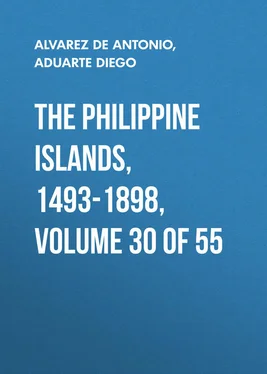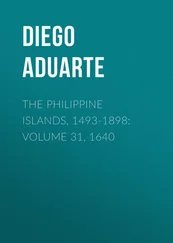Antonio Alvarez de Abreu - The Philippine Islands, 1493-1898, Volume 30 of 55
Здесь есть возможность читать онлайн «Antonio Alvarez de Abreu - The Philippine Islands, 1493-1898, Volume 30 of 55» — ознакомительный отрывок электронной книги совершенно бесплатно, а после прочтения отрывка купить полную версию. В некоторых случаях можно слушать аудио, скачать через торрент в формате fb2 и присутствует краткое содержание. Жанр: foreign_antique, foreign_prose, Историческая проза, на английском языке. Описание произведения, (предисловие) а так же отзывы посетителей доступны на портале библиотеки ЛибКат.
- Название:The Philippine Islands, 1493-1898, Volume 30 of 55
- Автор:
- Жанр:
- Год:неизвестен
- ISBN:нет данных
- Рейтинг книги:4 / 5. Голосов: 1
-
Избранное:Добавить в избранное
- Отзывы:
-
Ваша оценка:
- 80
- 1
- 2
- 3
- 4
- 5
The Philippine Islands, 1493-1898, Volume 30 of 55: краткое содержание, описание и аннотация
Предлагаем к чтению аннотацию, описание, краткое содержание или предисловие (зависит от того, что написал сам автор книги «The Philippine Islands, 1493-1898, Volume 30 of 55»). Если вы не нашли необходимую информацию о книге — напишите в комментариях, мы постараемся отыскать её.
The Philippine Islands, 1493-1898, Volume 30 of 55 — читать онлайн ознакомительный отрывок
Ниже представлен текст книги, разбитый по страницам. Система сохранения места последней прочитанной страницы, позволяет с удобством читать онлайн бесплатно книгу «The Philippine Islands, 1493-1898, Volume 30 of 55», без необходимости каждый раз заново искать на чём Вы остановились. Поставьте закладку, и сможете в любой момент перейти на страницу, на которой закончили чтение.
Интервал:
Закладка:
The fifth reason has the same ground as the fourth; for, on account of the diversion of forces and the expense which the enemy now encounters in the Orient and in the forts of Moluco, he is compelled to refrain from annoying the Western Indias, and must devote less attention, military force, and money to that object. And since what he spends or fails to gain in India enables the Philipinas to oppose or to embarrass him, it follows that if he there shall gain more and spend less, he will here take possession of both [the Indias]. And if the Indias, even with so effective a diversion [of the enemy’s force as they have now], need the Windward Fleet which is being built there, and for which a subsidy of 600,000 ducados is granted annually: in order to dispense with the garrisons, fleets, and expenditures in India everything would have to be increased, so that in the Indias more expense would be incurred for their defense than is consumed in the Philipinas.
The sixth is a reason of honor and profit, for these two admirable results follow from the victories which the inhabitants of Philipinas have gained over the Dutch: honor, on account of the glory which the Catholic arms acquire in those seas, which gains for them the esteem of the Japanese, Chinese, Sianese, Mindanaos, and innumerable other peoples, who serve as spectators in the theatre for such exploits; and profit, since, if the enemy’s forces are weakened it follows that, besides those that he loses in being conquered, he is compelled to expend still greater ones in order to keep his foothold. This is the most notable reason for maintaining powerful squadrons on the sea, in order that if the pirate undertakes to plunder successfully, he will have to do it with so great a force that either he will abandon the prize because he cannot hold it, or he will let it alone because the profits do not make it worth his while. Of the victories which the Spaniards have gained in those seas there are extant histories and accounts; and in the large memorial some of these are mentioned.
The seventh is, that [by the islands] are aided the two crowns of Castilla and Portugal, who are so united and in so fraternal relations in the Orient, each possessing its share of the two parts into which that region is, as we have said, divided. If we are to base our opinion on experience, the facts are evident in the restoration of Moluco; for in the time of Governor Don Juan de Sylva the forces of both crowns were joined, and it is regarded as certain that, if death had not intercepted his designs, he would have driven from those seas the arms of Holanda and of Inglaterra, and awakened fear and dread in many kings who were awaiting the result of so powerful a combination; and, even though success is not always so immediate, it suffices that it should be possible to make the enemy fear, and to lead them to believe that what has occurred sometimes may occur often.
The eighth reason is to protect and preserve the commerce of China for both crowns. For this argument it is taken for granted that this commerce is one of the most beneficial and lucrative of those in the entire Orient; and we can say that there is no other in all the world that equals it. The Oriental traffic of ancient times, which the Romans so highly valued, originated in China and in the drugs, fabrics, and curiosities of that country – although, as they were ignorant of its real origin, they called it the India trade, since they received it from that country. In the larger memorial I have already discoursed upon this at length. Now all the nations in those [Oriental] kingdoms take part in this commerce, but it is conducted most extensively and steadily by the Portuguese of India and the Castilians of Manila; we shall soon relate how important it is to the latter. Of the Portuguese it suffices to say that they possess in China the city of Macan, and the privilege of entering that of Canton; and the commerce of these two cities they maintain through the Strait of Sincapura, though always in danger from the Dutch. But as the profits are so great, they sail by that route; it adds much to their safety that they cross through the seas of Philipinas, and that Macan can find succor in Manila. But if this should be lacking, Macan could not remain many years without ruin, nor could India enjoy the commerce with China, which is one of those which most benefit her; and if the Chinese trade is cut off from India and Manila, the Dutch alone will be strong enough to carry it on. Although they are at present shut out from it by the robberies that they have committed on the Sangleys, they would not find it difficult to bring the latter to friendship with them; for it is already known that when money is lacking in Philipinas the Sangleys carry their merchandise to the Dutch. Therefore, on the preservation of those islands depends that of the Chinese trade.
These eight fundamental reasons are sufficient to prove the importance and necessity that exist for maintaining, preserving, and favoring those islands; for if they were lost the resulting damage would be great and excessive beyond any possible comparison or proportion to what the islands now cost us. And because there is seen in this an error of misapprehension, I will make a statement regarding it that is worthy of much attention and notice. This is, that it costs the royal exchequer more to support the island of San Martin 5 5 St. Martin, one of the Antilles, was a resort for French pirates and Dutch smugglers until 1638, when it was captured by the Spaniards. It was afterward recovered from them, and in 1648 was formally divided between the French and Dutch – a status that still prevails.
– which is of no use, and has no more effect than to remove an obstacle to the navigation of the Indias, and take away a landing-place from the pirates (who already have numberless others) – than to maintain the Philipinas Islands, which have the utility and effectiveness which I have stated.
For the proof of this, I avail myself of a summary of the detailed statements in the larger memorial, regarding the cost of the Philipinas. For the officials of justice, who govern them, 37,077 pesos; for the entire ecclesiastical estate, 37,277 pesos. In maintaining friendly relations with neighboring kings, 1,500 pesos. In the administration of the royal exchequer, 11,550 pesos. For the land forces at Manila, and in the military posts of all the islands, 229,696 pesos. For wars on land, and the forts in Moluco, 97,128 pesos. For naval war, shipbuilding, and navy-yards, 283,184 pesos. For supplies and provisions for all the soldiers and seamen, 153,302 pesos. These sums amount to 850,734 pesos, which is the expenditure made each year for the islands – not omitting to reckon wages and salaries, scanty though they be. This, therefore, is all the charge for their cost which can be made.
On the credit side of the account, the tributes from the crown encomiendas are worth each year 53,715 pesos; and the two reals which are paid to the king by each Indian in the private encomiendas amount to 21,107 pesos. The licenses which are given to the Sangleys come to 112,000 pesos; and the tributes from these Sangleys, to 8,250. The fifth and the tenth of gold, 750 pesos. The ecclesiastical tithes, which are collected by the royal exchequer for the support of the prelates and clergy, 2,750 pesos. The freight charges in his Majesty’s ships, 350 pesos. The court fines, 1,000 pesos. The customs duties, 38,000 pesos. The mesada and half-annats, 6,000. From these ten sources the income amounts to 243,922 pesos; to this must be added the imposts, freight dues, and customs duties which are collected in Nueva España on the merchandise that comes from the islands – all which amount to 300,000 pesos, and this is income that results and proceeds from the islands; accordingly, by a decree of February 19, 1606, it is commanded that these charges, adding to their amount each year, be remitted to Manila, and that so much less be sent from the royal exchequer of Mexico. And if all these goods are sold and traded in Nueva España once, or two or more times, and pay the customary charges of alcabala, 6 6 The alcabala, an excise duty collected on all sales of commodities, was derived from the Moors, and was more or less imposed in Spain from the year 1342 on. It was introduced in the American colonies in 1574, and for more than two centuries was a rich source of income for the Spanish crown and a heavy tax on the colonists. The rate was at first two per cent, but afterward this was doubled and trebled; and it was levied on every transfer of goods, taxing property over and over again. See Bancroft’s Mexico, iii, pp. 658, 659; and Recopilación leyes de Indias, lib. viii, tit. xiii, and lib. ix, tit. xlv, ley lxvi.
if the rate of two [per cent] which they usually pay was moderated to 30,000 pesos in the larger memorial, the rate on the said [sales] will certainly amount to 60,000 pesos. With this, the islands now have 593,922 pesos to their credit; so that their [actual] expense cannot be estimated at more than 256,812 pesos – [and that] without counting the proceeds of the Crusade, those from intestate property, or the monopoly of playing-cards.
Интервал:
Закладка:
Похожие книги на «The Philippine Islands, 1493-1898, Volume 30 of 55»
Представляем Вашему вниманию похожие книги на «The Philippine Islands, 1493-1898, Volume 30 of 55» списком для выбора. Мы отобрали схожую по названию и смыслу литературу в надежде предоставить читателям больше вариантов отыскать новые, интересные, ещё непрочитанные произведения.
Обсуждение, отзывы о книге «The Philippine Islands, 1493-1898, Volume 30 of 55» и просто собственные мнения читателей. Оставьте ваши комментарии, напишите, что Вы думаете о произведении, его смысле или главных героях. Укажите что конкретно понравилось, а что нет, и почему Вы так считаете.












